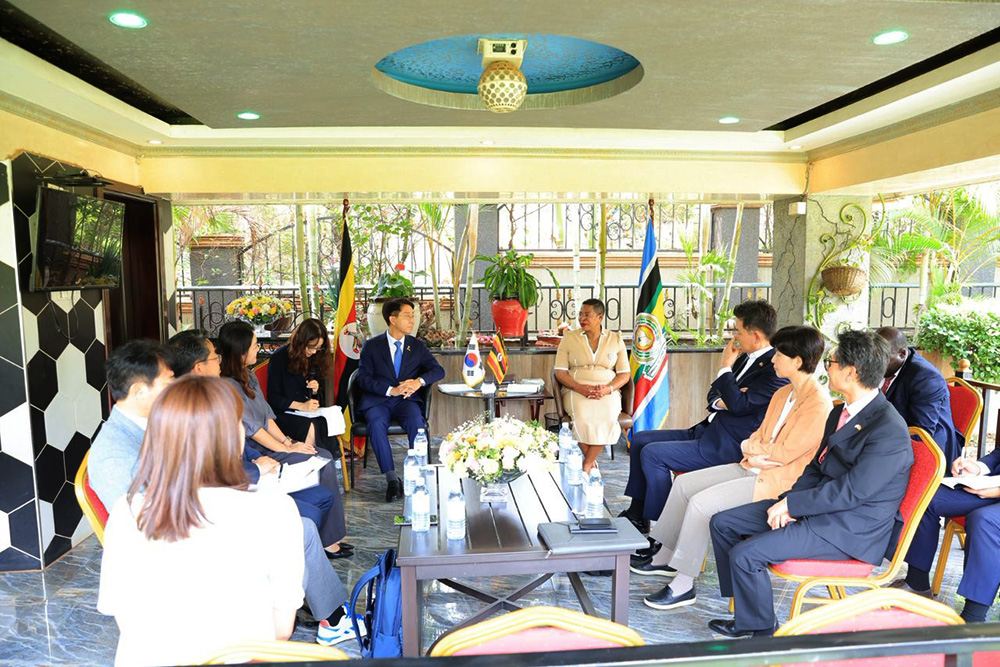Uganda urged to establish embassy in South Korea to deepen bilateral ties
Ambassador Park, who was accompanied by a delegation of Members of Parliament from the Korean National Assembly, stressed that a dedicated diplomatic presence in Seoul would enhance parliamentary and development cooperation between the two countries.
South Korea’s Ambassador to Uganda, Park Sung-Soo with the Speaker of Parliament, Anita Among. (Courtesy photo)
__________________
The Ugandan government has been urged to consider establishing an embassy in the Republic of Korea to further strengthen bilateral ties. The proposal was made by South Korea’s Ambassador to Uganda, Park Sung-Soo, during a meeting with the Speaker of Parliament, Anita Among.
Ambassador Park, who was accompanied by a delegation of Members of Parliament from the Korean National Assembly, stressed that a dedicated diplomatic presence in Seoul would enhance parliamentary and development cooperation between the two countries.
Speaker Among pledged to follow up urgently with the Ministry of Foreign Affairs on the proposal.
The discussions centred on boosting diplomatic relations, parliamentary cooperation, and strategic development partnerships.
Speaker of Parliament Anita Among met South Korea’s Ambassador to Uganda, Park Sung-Soo, who led Members of Parliament from the Korean National Assembly. (Courtesy photo)
Among commended South Korea for its support to Uganda in health, education, water, and sanitation, noting the importance of sustained investment for socio-economic development.
"We encourage you to remain good friends of Uganda. As we strengthen parliamentary and diplomatic cooperation, let us also work together to invest more in the health sector for sustainable development," Speaker Among said on Monday, September 22, 2025, at her residence in Nakasero, Kampala.
The meeting also highlighted Uganda’s collaboration with South Korea in the peaceful use of nuclear technology.
South Korea is assisting Uganda in building a nuclear facility to boost research, energy development, and medical applications, reflecting a growing technical and scientific partnership.
Uganda and South Korea have maintained cordial relations since 1963, with cooperation spanning trade, education, infrastructure, and technological development. The engagement signalled a continued commitment to deepening bilateral relations and exploring new areas of mutual benefit.
In efforts to advance digital education, Makerere University has launched a project titled “Project for Enhancing the Distance Education Environment at Makerere University in Uganda.” The $12.2m (sh45b) project is funded by the government of South Korea through the Korea International Cooperation Agency (KOICA).
KOICA’s collaboration with Makerere University follows a multi-phased approach, focusing on capacity building, infrastructure development, and the creation of a master plan for digital education.
Meanwhile, the Ugandan government has signed a memorandum of understanding (MOU) with Korea Hydro and Nuclear Power Co. Ltd to develop a $4 billion (Sh15 trillion), 2,000MW nuclear power plant in Buyende district. In addition, the Ministry of Energy and Mineral Development signed a separate MOU with Soroti University to establish a Centre for Nuclear Science to provide specialised training and research in nuclear technology. The government has also entered into an agreement with INVAP, an Argentina-based company, to develop, equip, and maintain the Centre for Nuclear Science at Soroti University.
At the regional level, the establishment of the Korea-Africa Foundation under the Korean Ministry of Foreign Affairs in 2018 has promoted private-sector exchanges, helping Korea and Africa expand cooperation in areas such as trade, investment, infrastructure, minerals and energy, defence, e-government, and digital technologies. Korea attained African Union (AU) observer status in 2005, paving the way for deeper engagement with the AU.
In 2006, through “Korea’s Initiative for Africa’s Development”, Seoul committed to sharing its developmental expertise with African nations. That same year, the Korea-Africa Economic Cooperation (KOAFEC) Ministerial Conference and the Korea-Africa Forum (KOAF) were launched in April and November, respectively, providing platforms for sustained collaboration between Korea and Africa.